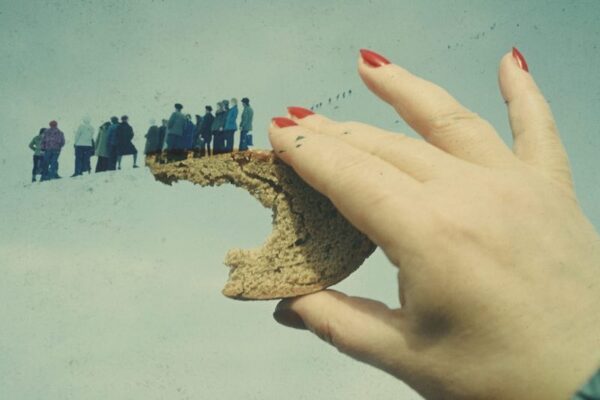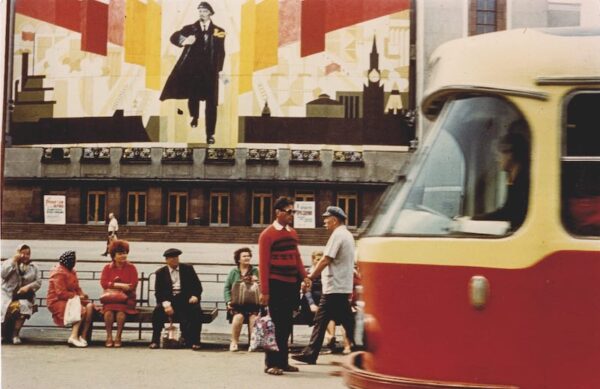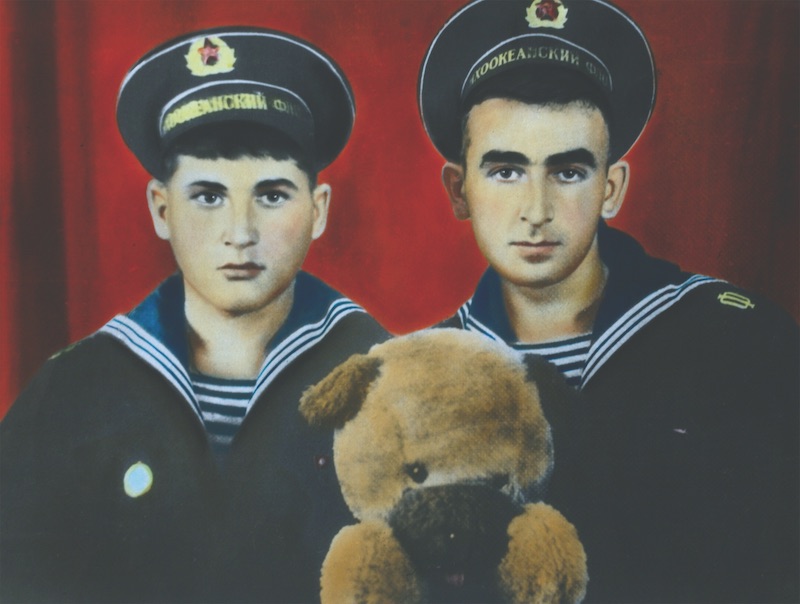Flags and banners, a tractor, a soldier with a pink rose, a cracked scarlet table with plastic flowers and green jugs, a man with a string bag at a red bus stop. The series Red from this retrospective of Boris Mikhailov’s photography includes unofficial glimpses of official parades and propaganda, where the colour is ubiquitous. In one photo from a nearby series, a woman in a fur hat and white coat sells cakes in the snow below a statue of Lenin. In the everyday details of daily life and ordinary people, Mikhailov feels a bit like a Soviet Martin Parr, but his later work explores darker and more experimental avenues.
Ukrainian Diary spans more than half a century of photography by the self-taught artist. Two floors of the Photographer’s Gallery are roughly divided by the collapse of the Soviet Union. On the top floor, defiantly unconventional pictures critique the ideological straightjacket of communist rule. The floor below displays photos from the decades that followed, including images of burning barricades from the pre-war protests in 2014.
Soviet propaganda often featured idealised physical forms and landscapes. Men and women, glowing with health and happiness, could be seen at work and play. Mikhailov’s photographs form parodies or direct antitheses to this aesthetic of perfection. His imagery is only accidentally beautiful, focusing instead, with care and intention, on the mundane, the discarded, decrepit and indecent, the crude, the sad and the ugly. Images are sometimes hand-coloured with deliberate artificiality, layered, blurred, doctored or purposefully poorly-framed.
Dozens of different projects are on display here. Born in 1938 in the industrial city of Kharkiv, Mikhailov became a photographer in the 1960s, inspired by the “Blue Horse” group of 1950s students whose joyful beach photos were condemned as debauchery. Given a camera to record the glorious daily life of the factory he worked in, he was sacked after using it to take naked portraits of his wife. The KGB found his photos, and he narrowly escaped prison.
 From the series “Yesterday’s Sandwich”, 1960s-1970s © Boris Mikhailov, VG Bild-Kunst, Bonn, Courtesy Boris and Vita Mikhailov
From the series “Yesterday’s Sandwich”, 1960s-1970s © Boris Mikhailov, VG Bild-Kunst, Bonn, Courtesy Boris and Vita Mikhailov
One of his earliest projects, Yesterday’s Sandwich, starting in the late sixties, came about by chance and is shown here as a huge and mesmerising slideshow. “One day I threw a bunch of slides on a bed and two of them stuck together,” says Mikhailov in one of the show’s many direct quotations from the artist. “Fascinated by the resulting image, I started superimposing one slide on top of another and placing them in a frame, putting them together like a sandwich.” The results are strange, ghostly compositions: a fried egg floats above an ocean, a man jumps past a seemingly huge frog, a woman’s body echoes a mountain.
More than just surreal, these pictures contain coded political allusions and covertly expose the “contradictions of Soviet society”. Some photos mock the celebratory distortions of Soviet posters, creating an alternative iconography. A 1980s collection called Unfinished Dissertation is a bleakly brilliant assemblage of apparently inconsequential shots on the back of typed pages from a discarded dissertation found in a rubbish bin, symbols of frustration and waste.
 From the series “Red”, 1968-75. © Boris Mikhailov, VG Bild-Kunst, Bonn, Courtesy Boris and Vita Mikhailov
From the series “Red”, 1968-75. © Boris Mikhailov, VG Bild-Kunst, Bonn, Courtesy Boris and Vita Mikhailov
An artist who creates confronting and sometimes controversial images, his post-Soviet series Case History is represented here by a glass case full of small photos rather than the usual larger wall-sized images. The staged portraits document the grim lives of homeless people in his home city. “I felt it was my social responsibility to photograph these people,” says Mikhailov. His catalogue of horrors is laced with compassion, but can feel prurient: drunk old women with bare breasts, tattered, toothless men with no trousers.
The photographer is equally willing to compromise his own dignity. In the series, I am Not I (1992), he poses naked for numerous satirical self-portraits with a huge plastic phallus, an enema bag, a sword and ridiculous curly wig. “The country was changing,” explains Mikhailov. “If in the Soviet era, we knew who the heroes were, now the very idea of a hero had been destroyed. So there could only be an anti-hero.”
This is Mikhailov’s first major UK retrospective. He lives now with his wife Vita in Berlin and Kharkiv, Ukraine’s much-bombed second city, close to the border with Russia. Some of the more recent photos, titled “The Theatre of War…” show the dramatic 2013-2014 pro-European uprisings in Maidan Square, known in Ukraine as the Revolution of Dignity.
“I think it might have been more accurate to title this series “Premonition of War… ” the artist comments. “The bonfires, the colours, the lights, the people sitting there exhausted … It was unclear how it would all end.” A decade on, it’s less clear than ever how the war will end, but Mikhailov’s photos now have an added poignancy, a sense of the powerful resilience and uniqueness of Ukrainian culture, even after years of brutal invasion.
Runs alongside Zofia Rydet: Sociological Record until 22 February 2026
The Reviews Hub Star Rating
80%
Powerful and poignant
